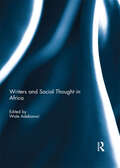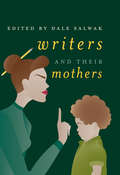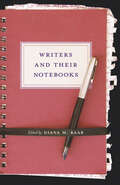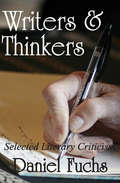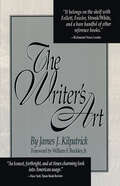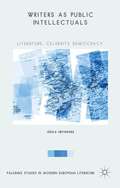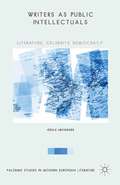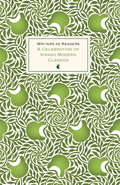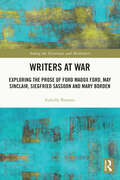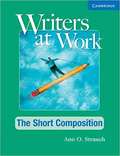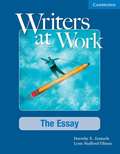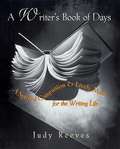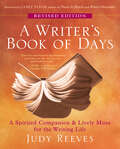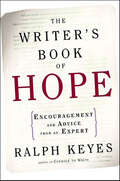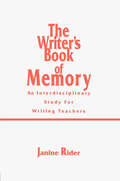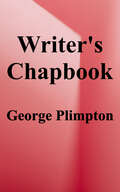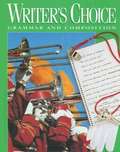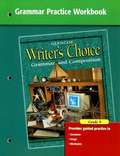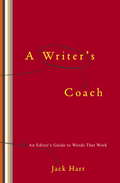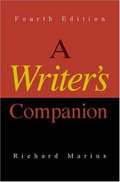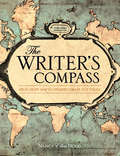- Table View
- List View
Writers and Social Thought in Africa
by Wale AdebanwiSocial theory and social theorizing about Africa has largely ignored African literature. However, because writers are some of the continent’s finest social thinkers, they have produced – and continue to produce – works which constitute potential sources for the analysis of social thought, and for constructing social theory, in and beyond the continent.This comprehensive collection examines the relationship between African literature and African social thought. It explores the evolution and aesthetics of social thought in African fiction, and African writers’ conceptions of power and authority, legitimacy, history and modernity, gender and sexuality, culture, epistemology, globalization, and change and continuity in Africa.This book was originally published as a special issue of the Journal of Contemporary African Studies.
Writers and Their Mothers
by Dale SalwakIan McEwan, Margaret Drabble, Martin Amis, Rita Dove, Andrew Motion and Anthony Thwaite are among the twenty-two distinguished contributors of original essays to this landmark volume on the profound and frequently perplexing bond between writer and mother. In compelling detail they bring to life the thoughts, work, loves, friendships, passions and, above all, the influence of mothers upon their literary offspring from Shakespeare to the present. Many of the contributors evoke the ideal with fond and loving memories: understanding, selfless, spiritual, tender, protective, reassuring and self-assured mothers who created environments favorable to the development of their children’s gifts. At the opposite end of the parenting spectrum, however, we also see tortured mothers who ignored, interfered with, smothered or abandoned their children. Their early years were times of traumatic loss, unhappily dominated by death and human frailty. Elegantly assembled and presented, Writers and Their Mothers will appeal to everyone interested in biography, literature, and creativity in general.
Writers and Their Notebooks
by Diana M. RaabPersonal reflections on the vital role of the notebook in creative writing, from Dorianne Laux, Sue Grafton, John Dufresne, Kyoko Mori, and more.This collection of essays by established professional writers explores how their notebooks serve as their studios and workshops—places to collect, to play, and to make new discoveries with language, passions, and curiosities. For these diverse writers, the journal also serves as an ideal forum to develop their writing voice, whether crafting fiction, nonfiction, or poetry. Some include sample journal entries that have since developed into published pieces. Through their individual approaches to keeping a notebook, the contributors offer valuable advice, personal recollections, and a hearty endorsement of the value of using notebooks to document, develop, and nurture a writer’s creative spark.
Writers and Thinkers: Selected Literary Criticism
by Daniel FuchsThis is a collection of critical essays that integrate literature and ideas. Daniel Fuchs presents the writer's individuality as artist and thinker, focusing on the writer's interaction within a wide range of cultural, political, and historical periods and situations representative of the modern period. The essays reflect a progression that goes beyond chronology or historical survey in the consistency and interrelation of the literary and cultural themes explored and the references within them.The book is built around writers who are of central concern to the author. It does not pretend to be a comprehensive framework for analysing modernism. Fuchs first deals with high modernism, in discussions of Hemingway and Stevens, who in different ways critique tradition and collapsing values. The essays that follow deal with the "contemporary,"and here the focus is mainly on American Jewish writers and their cultural impact after modernism.The author's stance is in relation not only to these traditions but to others that might be thought antagonistic: the formalism of the New Critics and the deconstructionism that reduces the author to a replaceable variable in the dialects of cultural power relations. Fuchs pays tribute to the former, illustrating wider points in literary, socio-cultural, and political history. The overall emphasis on these "extrinsic" matters underscores the book's appeal to a wide audience.
The Writer's Art
by James J. Kilpatrick“A witty, entertaining, and enlightening antidote to sloppy, inflated, vague, or dull prose.” —Publishers WeeklyWriting comes in grades of quality in the fashion of beer and baseball games—good, better, and best. With the experience of a lifetime spent writing, James J. Kilpatrick wants to make a few judgment calls. Here, in the great tradition of Theodore Bernstein, Edwin Newman, and William Safire, a master of the art gives us a finely crafted, witty guide to writing well. Intended for laymen and professionals alike, The Writer’s Art highlights techniques and examples of good writing—and a section of the book called “My Crotchets and Your Crotchets” comprises more than two hundred personal judgment calls, often controversial, often funny, on word usage.“Put it on your shelf between Strunk & White’s Elements of Style and William Zinsser’s On Writing Well.” —Cleveland Plain Dealer“An honest, forthright, and at times charming look into American usage.” —The New York Times Book Review“The Writer’s Art is itself a work of art.” —Dallas Morning News
Writers as Public Intellectuals: Literature, Celebrity, Democracy (Palgrave Studies in Modern European Literature)
by Odile HeyndersThis book demonstrates how authors performing the role of a public intellectual discuss ideas and opinions regarding society while using literary strategies and devices in and beyond the text. Their assumed persona thereby reads the world as a book - interpreting it and offering alternative scenarios for understanding it.
Writers as Public Intellectuals: Literature, Celebrity, Democracy (Palgrave Studies in Modern European Literature)
by Odile HeyndersThis book demonstrates how authors performing the role of a public intellectual discuss ideas and opinions regarding society while using literary strategies and devices in and beyond the text. Their assumed persona thereby reads the world as a book - interpreting it and offering alternative scenarios for understanding it.
Writers as Readers: A Celebration of Virago Modern Classics (VMC Designer Collection)
by Virago PressMargaret Drabble | Beryl Bainbridge | Angela Carter | Maggie O'Farrell | Elizabeth Jane Howard | A. S. Byatt | Penelope Lively | Sarah Waters | Jonathan Coe | Diana Souhami | Jilly Cooper | Elizabeth Bowen | Mark Bostridge | Alexander McCall Smith | Sarah Dunant | Rachel Cooke | Zadie Smith | Anita Desai | Sophie Dahl | Clare Boylan | Paula McLain | Diana Athill | Marina Lewycka | Claire Messud | Michèle Roberts | Simon Russell Beale | Amanda Craig | Hilary Mantel | Elizabeth Taylor | Ali Smith | Linda Grant | Jane Gardam | Julie Burchill | Carmen Callil | Helen Oyeyemi | Marian Keyes | Nora Ephron | Sandi Toksvig | Kate SaundersWriters as Readers is a celebration of forty years of the Virago Modern Classics list. Started in 1978, Virago Modern Classics is dedicated to the rediscovery and championing of women writers, challenging the often narrow definition of 'classic'. In this collection, forty of the most significant writers of the past century tell us about one of their favourite writers by introducing books from the Virago Modern Classics collection, offering a glimpse at the treasures that have been published over the past four decades: they may be great works of literature; they may be wonderful period pieces; they may reveal particular aspects of women's lives; they may be classics of comedy, storytelling, diary-writing or autobiography.
Writers at War: Exploring the Prose of Ford Madox Ford, May Sinclair, Siegfried Sassoon and Mary Borden (Among the Victorians and Modernists)
by Isabelle BrasmeWriters at War addresses the most immediate representations of the First World War in the prose of Ford Madox Ford, May Sinclair, Siegfried Sassoon and Mary Borden; it interrogates the various ways in which these writers contended with conveying their war experience from the temporal and spatial proximity of the warzone and investigates the multifarious impact of the war on the (re)development of their aesthetics. It also interrogates to what extent these texts aligned with or challenged existing social, cultural, philosophical, and aesthetic norms. While this book is concerned with literary technique, the rich scholarship on questions of gender, trauma, and cultural studies on WWI literature serves as a foundation. This book does not oppose these perspectives but offers a complementary approach based on close critical reading. The distinctiveness of this study stems from its focus on the question of representation and form and on the specific role of the war in the four authors’ literary careers. This is the first scholarly work concerned exclusively with theorising writing produced from the immediacy of the war. This book is intended for academics, researchers, PhD candidates, postgraduates and anyone interested in war literature.
Writers at Work: The Short Composition Student's Book
by Ann O. StrauchThe Writers at Work series prepares ESL students to tackle academic essay writing. Writers at Work: The Short Composition teaches low-intermediate to intermediate-level students how to compose multi-paragraph short compositions. Students tap into their personal experience to organize their writing, using academic modes of organization such as exemplification and cause and effect. In addition, students learn how to write about works of fiction and nonfiction by summarizing and citing sources.
Writers at Work: The Essay
by Dorothy E. Zemach Lynn Stafford-YilmazThe Writers at Work series takes beginning to high intermediate-level writing students through a process approach to writing. The series is intended primarily for adults whose first language is not English, but it may also prove effective for younger writers or for native speakers of English who are developing their competence as independent writers in English.
A Writer's Book of Days
by Judy Reeves"A Writer's Book of Days is a holistic approach to being a writer that encompasses the physical, emotional, and spiritual as well as the creative aspects of writing." The book includes daily writing prompts, quotes from writers about writing, and habits of established writers as well as other suggestions for becoming a write. Some comma faults, other punctuation faults like possessives, and some grammatical errors are in the book itself and were not changed.
A Writer's Book of Days: A Spirited Companion and Lively Muse for the Writing Life
by Judy ReevesFirst published a decade ago, A Writer's Book of Days has become the ideal writing coach for thousands of writers. Newly revised, with new prompts, up-to-date Web resources, and more useful information than ever, this invaluable guide offers something for everyone looking to put pen to paper — a treasure trove of practical suggestions, expert advice, and powerful inspiration. Judy Reeves meets you wherever you may be on a given day with: • get-going prompts and exercises • insight into writing blocks • tips and techniques for finding time and creating space • ways to find images and inspiration • advice on working in writing groups • suggestions, quips, and trivia from accomplished practitioners Reeves's holistic approach addresses every aspect of what makes creativity possible (and joyful) — the physical, emotional, and spiritual. And like a smart, empathetic inner mentor, she will help you make every day a writing day.
The Writer's Book of Hope: Encouragement and Advice from an Expert
by Ralph KeyesIn 1889, the editor of the San Francisco Examiner, having accepted an article from Rudyard Kipling, informed the author that he should not bother to submit any more. "This isn't a kindergarten for amateur writers," the editor wrote. "I'm sorry, Mr. Kipling, but you just don't know how to use the English language." A century later, John Grisham was turned down by sixteen agents before he found representation-and it was only after Hollywood showed an interest in The Firm that publishers began to take him seriously. The anxiety of rejection is an inevitable part of any writer's development. In this book, Ralph Keyes turns his attention from the difficulty of putting pen to paper-the subject of his acclaimed The Courage to Write -to the frustration of getting the product to the public. Inspiration isn't nearly as important to the successful writer, he argues, as tenacity, and he offers concrete ways to manage the struggle to publish. Drawing on his long experience as a writer and teacher of writing, Keyes provides new insight into the mind-set of publishers, the value of an agent, and the importance of encouragement and hope to the act of authorial creation.
The Writer's Book of Memory: An Interdisciplinary Study for Writing Teachers
by Janine RiderMemory has long been ignored by rhetoricians because the written word has made memorization virtually obsolete. Recently however, as part of a revival of interest in classical rhetoric, scholars have begun to realize that memory offers vast possibilities for today's writers. Synthesizing research from rhetoric, psychology, philosophy, and literary and composition studies, this volume brings together many historical and contemporary theories of memory. Yet its focus is clear: memory is a generator of knowledge and a creative force which deserves attention at the beginning of and throughout the writing process. This volume emphasizes the importance of recognizing memory's powers in an age in which mass media influence us all and electronic communication changes the way we think and write. It also addresses the importance of the individual memory and voice in an age which promotes conformity. Written in a strong, lively personal manner, the book covers a great deal of scholarly material. It is never overbearing, and the extensive bibliography offers rich vistas for further study.
The Writer's Chapbook: A Compendium of Fact, Opinion, Wit, and Advice, from the 20th Century's Preeminent Writers
by George PlimptonMaster compiler George Plimpton has created a fascinating and delightful survey of writers on writing in this collection of excerpts primarily from The Paris Review interviews.
Writers Choice: Grammar and Composition Grade 8 (OK Edition)
by Mcgraw-Hill GlencoeAs a student your writing and your choices are what this book is all about. You will apply a wide range of strategies to comprehend, interpret, evaluate, appreciate, and respond to a wide variety of texts.
Writer's Choice: Grammar and Composition
by Jacqueline Jones Royster Mark LesterImprove your skills of composition, grammar, usage, and mechanics by reading this book.
Writer's Choice: Grammar Practice Workbook (Grade #9)
by The Editors at The McGraw-Hill CompaniesA practice oriented grammar workbook covering topics from parts of speech through sentence structures to punctuation.
A Writer's Coach
by Jack HartMystified over misplaced modifiers? In a trance from intransitive verbs? Paralyzed from using the passive voice? To aid writers, from beginners to professionals, legendary writing coach Jack Hart presents a comprehensive, practical, step-by-step approach to the writing process. He shares his techniques for composing and sustaining powerful writing and demonstrates how to overcome the most common obstacles such as procrastination, writer’s block, and excessive polishing. With instructive examples and excerpts from outstanding writing to provide inspiration,A Writer’s Coachis a boon to writers, editors, teachers, and students.
A Writer's Companion (4th Edition)
by Richard MariusThis brief guide to writing the essay and writing across the curriculum is indeed true to its title. It offers excellent advice on developing and polishing prose, with an emphasis on style and process--all with wit, charm, and intelligence.
The Writer's Compass: From Story Map to Finished Draft in 7 Stages
by Nancy Ellen DoddMap out your idea and finish your story in 7 stages! This book will show writers how to develop their ideas into a finished novel by working through it in 7 stages, while learning how to mapping out their story's progress and structure so they can evaluate and improve their work. It teaches writers to visualize their story's progress with a story map that helps them see all the different components of their story, where these components are going, and, perhaps most importantly, what's missing. The book simplifies Aristotle's elements of good writing (a. k. a. that each story should have a beginning, a middle and an end) into easily applicable concepts that will help writers improve their craft. The author helps readers strengthen their work by teaching them how to focus on one aspect of their story at a time, including forming stories and developing ideas, building strong structures, creating vibrant characters, and structuring scenes and transitions. Thought-provoking questions help writers more objectively assess their story's strengths and weaknesses so they may write the story they want to tell.
The Writer's Craft: Idea to Expression
by Peter Elbow Sheridan BlauThis book recognizes that individuality, on every page you will be encouraged to discover techniques best suited to your own personal writing style. You will learn to think your way through every writing task, you will experiment with ideas and approaches as you are guided through a complete piece of writing. Cross-references to the Handbooks will allow you to find additional help when you need it. Then, as you write, you will discover what you think about yourself and about the world around you.
The Writer's Craft: Level 9
by McDougal LittellThis book recognizes the individuality. On every page the reader will be encouraged to discover techniques best suited to him/her own personal writing style. Just as important, the reader will learn to think his/her way through every writing task. In each of the Writer’s Workshops, the reader will experiment with ideas and approaches as he/she is guided through a complete piece of writing. Cross-references to the Handbooks will allow the reader to find additional help when need it. Then, as he/she writes, will discover what he/she thinks about himself/herself--and about the world around him/her.
